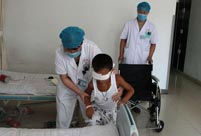BEIJING, Sept. 8 -- In a speech delivered at Kazakhstan's Nazarbayev University Saturday, visiting Chinese President Xi Jinping proposed for the first time the joint establishment of a "Silk Road economic belt" to boost cooperation between China and Eurasian countries.
The grand regional cooperation structure, Xi believed, can be set up through "strengthening policy communication, road connections, trade facilitation, currency circulation and heart connection."
Over the past two decades, the relationship between China and Eurasian countries has seen fast development, with railways and highways, oil and gas pipelines, electricity and telecommunications facilities forming a vast network across region that facilitates a massive flow of commodities, resources and capital.
With a total population of 3 billion and an unparalleled market both in scale and potential, the proposed economic belt will help countries in Eurasia, which have highly complementary economies and huge potential for future cooperation, turn their latent advantages in population, resources, market and technology into momentum for development and, in turn, further expand their opening-up and cooperation.
Greater cooperation will also help ensure stability through development in the region, where the "three evil forces" of terrorism, extremism and separatism have a strong presence. There has been broad consensus to build a harmonious region featuring lasting peace and common prosperity.
China has witnessed an average annual increase of 30.8 percent in trade with Central Asian, Western Asian and Southern Asian countries over the past decade. The proposed economic belt will add fresh impetus to China's drive to develop its west and will bring an additional source of growth in its foreign trade and investment.
The current growing trend toward world economic integration and increased regional cooperation also creates an opportune moment to revive the historical Silk Road. The call for greater regional cooperation also coincides with an eastward shift of the world's economic weight as well as the rise of emerging economies, which have become an important world economic engine since the 2008 financial crisis, and will help foster the integration and restructuring of Eurasian economies.
From a broader perspective of human development, the Silk Road had served as a bond linking the Chinese, Islamic, Slavic, Indian and Persian civilizations. It is believed that the innovative cooperative mode of the economic belt will revive the brilliant Silk Road, strengthen economic ties and advance cooperation among countries along the ancient trade route.
As Xi put it in his speech, the 2,000-plus year history of contact has demonstrated that nations with different racial, religious and cultural backgrounds may well share peace and common development as long as they stick to principles such as unity, equality, cooperation, accommodation, mutual trust and mutual benefit.
 Mountain of garbage in Nairobi
Mountain of garbage in Nairobi Highlights of MAKS 2013 Int'l Aviation and Space Show
Highlights of MAKS 2013 Int'l Aviation and Space Show  10th China-ASEAN Expo opens in Nanning
10th China-ASEAN Expo opens in Nanning Eagle Boy takes to sky to break another record
Eagle Boy takes to sky to break another record 12-year-old boy becomes pillar of the family
12-year-old boy becomes pillar of the family Eye-gouged boy receives blind rehabilitation in Shanxi
Eye-gouged boy receives blind rehabilitation in Shanxi Top 10 naked hotels in the world
Top 10 naked hotels in the world The most gorgeous Chinese women in the eyes of foreigners
The most gorgeous Chinese women in the eyes of foreigners A collection of bizarre rooftop buildings around China
A collection of bizarre rooftop buildings around China Putin intimate contacts with marine animals
Putin intimate contacts with marine animals China's frigate 'Bengbu'in fire training
China's frigate 'Bengbu'in fire training Fresh students 'forced' to register in university independently
Fresh students 'forced' to register in university independently 2013 Taiwan Int'l Tourism Expo kicks off in Taipei
2013 Taiwan Int'l Tourism Expo kicks off in Taipei Photo story: Take a gap year
Photo story: Take a gap year Nokia's Global Headquarters: visiting a declining empire
Nokia's Global Headquarters: visiting a declining empireDay|Week|Month